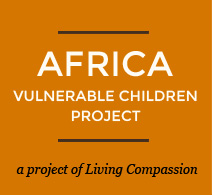Another giant, fabulous day!
A couple of classes were on break and a couple still in session when we arrived so we only had half a tidal wave of adorable bodies storming the car. In order to make space for us to open the doors, Susan created a decoy—an impromptu game of Zambian “ring around the rosy.” Whew!
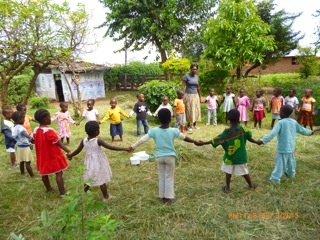
Susan comes to the rescue!
Theresa started her day in her usual routine of greeting each class.
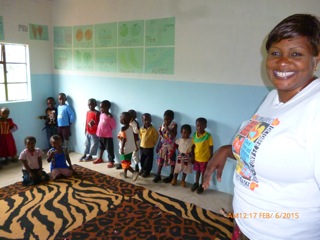
Theresa saying Good Morning to Ethel’s “baby class.”
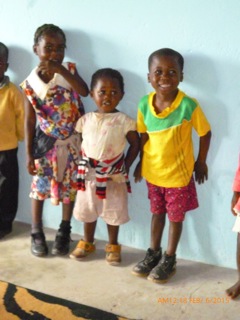
You know about Bruce now, on the right (see Wednesday’s blog) and meet Myles (left) vying with Bruce for most adorable in the whole program! She wins, hands-down, the smallest award.
After a few minutes of joining in various break-time games, we went to sit in on Charles’ class. Charles is a truly dedicated teacher. Time and time again he has taken on children who have never been in formal education, works with them to help them catch up, then sees that they are enrolled in their appropriate grade level in government school. Every student Charles has done this for has gone on to pass all grade-level exams. Wow.
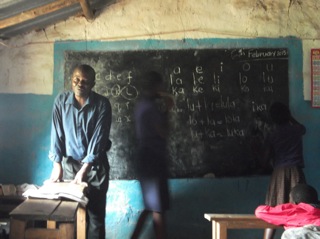
Charles in his classroom.
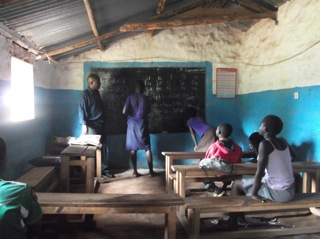
He always keeps the students engaged.
One such boy, named Jonathan, is an example. Some years back, he was outside the Living Compassion property several days in a row (not part of the program) and asked Theresa, “May I come eat?” She knew him and knew he was not in school. “You may come eat,” she told him, “But I want you also to come learn.” He eagerly agreed and joined Charles’ class. Within a few years, having applied himself diligently, Charles enrolled him in government school. He just passed his grade 7 exams and is in grade 8. Go, Jonathan!
We realized we do not yet have a photo of him. Will remedy that soon!
It was a pleasure seeing the classroom in action, AND, the best part may have been walking out and hearing a brave little voice shout from across the way, “Jenny, I am eating nshima.” (Because “Jenny” is easy to say and remember, it has come to be something of a stand-in greeting to indicate the Living Compassion U.S. team.) It was Ronika, Joanne’s daughter. This may seem just a cute moment, which indeed it was!, but it illustrates a huge movement that is underway. The children are starting to branch out from the English phrase, “How are you?” For years, “Hello, how are you?” “I am fine” was the sum total of our interaction with the children. This ability to move into simple, everyday phrases is spectacular. And we need only attempt to conjure up the Bemba equivalent from the many lessons the team has given us to remember just how difficult it is to find the appropriate phrase on the spot. Well done, Ronika!
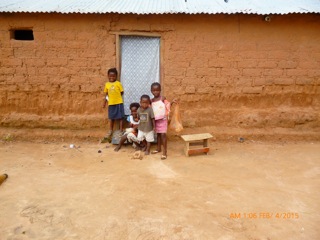
Ronika, middle sitting down, with younger Brother Michael and two cousins.
Walking back to other side of the property we encountered some of the team working on landscaping and gardening. With prolific rains November through April, it becomes a full-time job keeping the gardens kept and grasses trimmed.
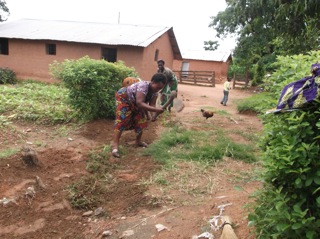
Brenda hoeing some weeds.
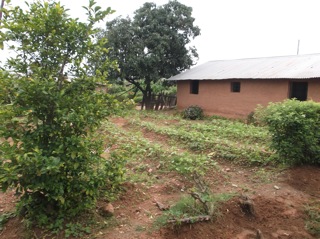
So beautiful, and nutritious—all of these greens, once matured, will be used for the lunch program.
Next on the agenda: Meeting with Theresa.
Even when we are not here, we keep in regular contact with the team through 4 weekly emails and a once-per-week phone call with Theresa. This is excellent and underlines the great progress that has been made in communication over the years. There are some things that are larger issues and more difficult to discuss long-distance. Theresa and we each keep lists of those things and check in when we are together, in-person. It is amazing the inspiring texture of the project that always emerges from these meetings. Here are just a couple of the highlights from this one:
Perhaps you remember Sophia, a member of the team who died of complications from AIDS a few months back. She left five children, with no relatives to care for them. Dying of AIDS is tragically common. Having no relatives at all to help pick up the pieces is fairly unusual. As she was dying in the hospital, members of the team took turns sitting with Sophia. Towards the end she spoke with Pauline, asking her to please promise her children will be cared for. Pauline assured her that the Living Compassion family would see to the children.
Theresa relayed a scene, just after the funeral, where Ruth, Sophia’s oldest daughter, 18 years old, came to Theresa crying. All her relatives had left. She was alone and scared. Theresa had tears in her eyes as she told us her response to Ruth, “We are your family. You are part of Living Compassion. You and your siblings will be well cared for. You will not be on your own.”
And from what Theresa went on to tell us, it sounds like Ruth has the characteristic most essential in her position—she knows how to ask for help. She is now the one to receive the cooperative stipend that used to go to Sophia. The first month, when she received what to her was an enormous sum of money, she immediately asked for assistance. What do I buy? And the team walked her through it: you need mealie meal, and it will be cheapest to buy a large bag for the whole month. You will need to hold money aside to buy “relish” each day (the vegetables and other things that people eat each day with nshima) through the month. She said she was not sure she could do that, that the temptation to spend it may be too great, so to start with, Veronica offered to hold the money for her and dole it out each day. When Ruth said that her brother needed new shoes and asked if she should go to Bata, the most common local shoe store, the team explained that those shoes would be very expensive and showed her where to buy good, used shoes at a small fraction of the price.
Ruth is one of the few young women of her age in Kantolomba who finished grade 12, last year. This is a testament to Sophia’s commitment to educate her children. However, she did not pass her exams and, in order to continue her studies would need to re-take those exams. The plan was for her to return to grade 12 this year, but that was before Sophia got sick. The death of her mother is a perfect example of how it happens that opportunities are lost. Ruth is now the mother of her siblings. She is all they have. Were they not part of Living Compassion, she would now be doing one of a handful of things local women do to survive: small business selling (e.g. walk into town and buy a large quantity of tomatoes then bring them back to Kantolomba and sell them at a tiny profit); brew the local liquor referred to in yesterday’s blog; if you are very lucky, work as a maid for a family slightly more advantaged in a neighboring community; or any number of desperate activities we know women are forced into all over the globe.
The Living Compassion team has a plan for Sophia—she will help out at the site in the mornings and enroll in the grade 12 continuing education program in the afternoons. It brings enormous joy to know that Ruth and her young siblings are being so well cared for and that the opportunities that were available to them when their mother was alive are being carried on. Sophia, we miss you and love you and your children are in good hands.
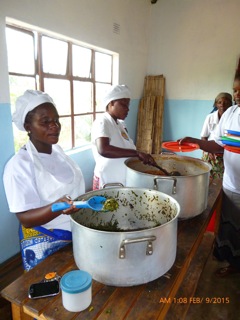
Ruth participating at Living Compassion.
Inspired by the success of Floriano, a young man in the community whom Living Compassion sponsored to learn to be a bricklayer, Theresa told us of one of her next long-term visions—to help girls who have dropped out of school due to early marriage and/or pregnancy. Floriano now lives in a good house, is married, has a child and is able to support his family. Theresa has a dream that when a girl who has dropped out comes to ask for assistance, that she may be able to get them enrolled in a skills program, giving them a way to support their family. We agreed we will start by simply taking each case individually, as a girl comes forward, and see if a formal program grows out of it.
As we met with Theresa, listening to all the recent happenings and the visions of what is to come, it struck us that we are mostly witnesses, reporters, facilitators at this point. We come and see all the transformation that is occurring, get to reflect the successes and challenges and witness the creation of the next steps and the planting of seeds for future visions. The team here has the ball and runs with it beautifully! What fun!
Just as we were finishing up, Veronica walked in proudly with one of her daughters and two granddaughters.
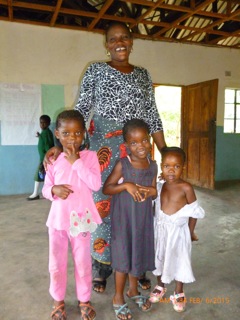
Veronica with, left to right: Granddaughter Veronica, daughter Elizabeth, and granddaughter Eva.
We had loaded a typing program onto several of the team computers. When we are in meetings and they watch us taking notes, typing quickly and without looking, they are eager to learn the skill. Sreedevi spent some time showing several team members as well as some of the older children. We know well that if we can get the children dialed in to some of the key technology opportunities, they will be the drivers for these to continue. With English and computers, the entire world opens up!
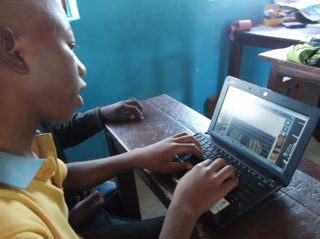
Twaibu starts it off.
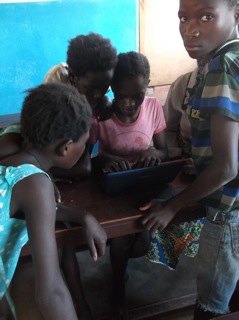
Soon a crowd has joined.
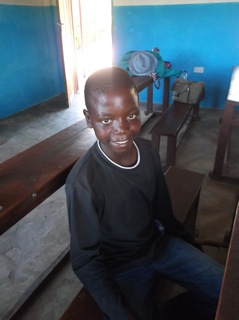
This fellow, Adrian, astounded us. He sat right down and made not a single error in the first 15 strokes. Everyone assured us he had never typed before.
Meanwhile Jen met with Theresa, Veronica, Pascal and Peter to lay out the possibility of a new dining hall. The team is eager to relocate the lunch program to one part of the property, a bit apart from the main building, leaving the rest of the property more of a quiet zone conducive to learning. The way they are proposing to go about it is a good example of the how of the project. Over time, they plan to buy local brick, the wood for the roof structure, and cement for laying the brick with the funds they receive from the Living Compassion water tap. They have asked the U.S. side to assist by purchasing the roofing sheets. This approach makes it a true community building in which everyone is invested.
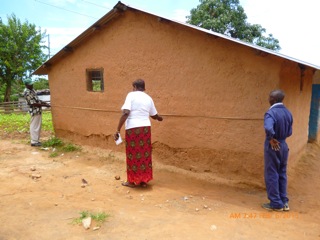
Peter, left, Theresa and Pascal, right, measuring an existing building to get a sense of the width of the new potential dining hall.
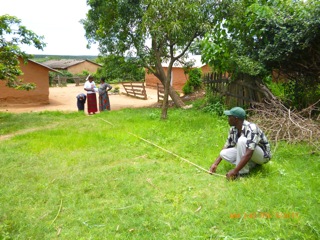
Laying out the length.
As if to underline our earlier realization at the growing English of the students, one young boy boldly walked up to us and engaged in a conversation! Yes, a back-and-forth exchange! He is something of a character and explained to us that he is campaigning as President of Kantolomba. When we asked him what he plans to offer the people, he responded, “food, clean water, good roads.” All in English! We all had a good laugh and hearty congratulations.
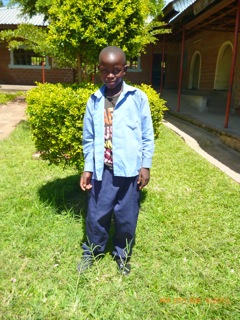
Celestino, aka Mr. President.
This segued into a number of students asking to have their picture taken. We played a little game where one could only have their photo taken if they asked in English. Within minutes over a dozen children had mastered, “Will you take my photo?” And it wasn’t easy. Many students had to repeat it over a dozen times before each word was recalled and in its correct place. It seems easy to learn a simple phrase like that, doesn’t it? But, if you are game, try this: Google some language you have no familiarity with and look up how to say, “Will you take my photo?” Then see how long it takes you to be able to repeat the phrase, in correct word order, without looking. It is much harder than it seems! Especially if it is in a language that uses sounds your brain is not familiar with. Our repeating Bemba phrases, even just single words, is guaranteed to produce a good belly laugh for all of us!
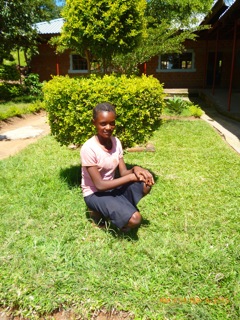
Natasha
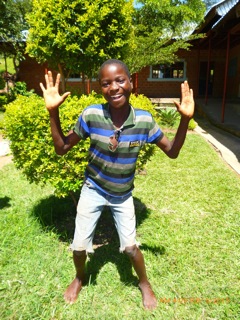
And after the third or fourth round of photos, the hamming-it-up began.
As we were preparing to leave, we saw Ethel putting a bundle of some plant material on her back. She explained that Priska had given her these sweet potato roots. Ethel would take them to her farm to plant. As many trips as we have made, we are always learning new things about the team, the community and life in Kantolomba. In this conversation we found out that nearly every member of the team (save the very oldest) rent plots of land during the rainy season and plant food for their own family consumption. This is the main activity on Saturdays. They will leave at 6am with their children, walk to the farm and go to work on the land. Veronica reports that she grows all the maize for family during this time, offering a great savings on buying mealie meal.
Ethel is one of the lucky few who inherited a farm from her mother and does not need to rent land. It’s a full life here. Might be a big clue as to the alive joyfulness we often project!
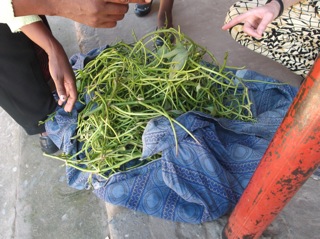
Ethel shows us her sweet potato roots.
We’re getting attached to the routine of walking out of Kantolomba and meeting Theresa in Lubuto. We project the team enjoys it as well. Today we get permission from a local woman to photograph a beautiful storage hut and thatched “shower” she has constructed.
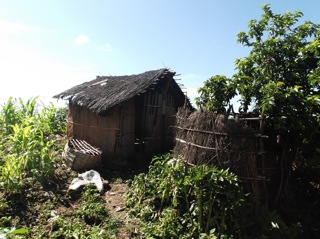
The storage structure
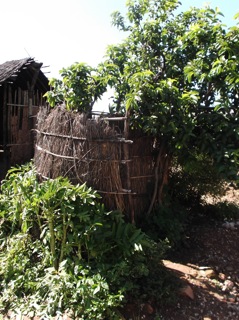
An ingenious and artful way to create privacy for bathing.
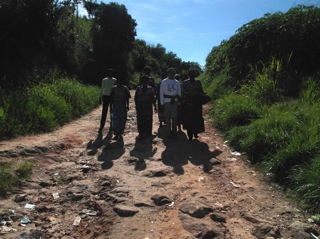
Finishing the day, and the week. What a team! Begin again on Monday…
